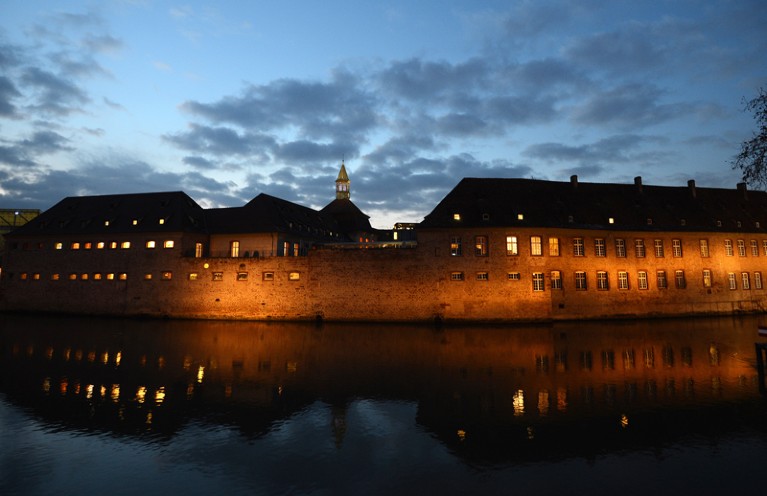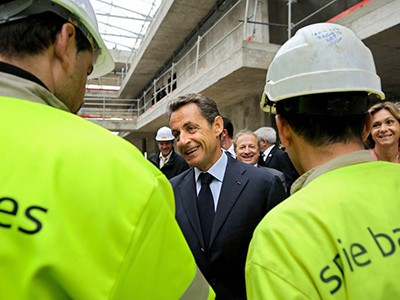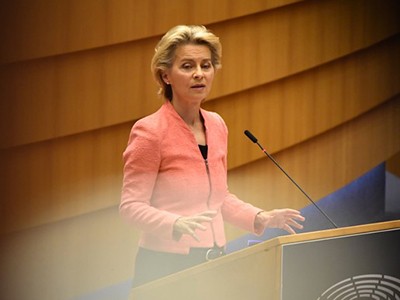
The founders of France’s École Nationale d’Administration wanted civil servants to be chosen according to ability.Credit: Patrick Hertzog/AFP/Getty
In the global debate about widening participation in education, one development has been relatively under-reported. French President Emmanuel Macron has announced that the country is closing the National School of Administration (École Nationale d’Administration; ENA) in Strasbourg, its 76-year-old graduate training academy for senior civil servants. ENA is to be replaced by a new Institut du Service Public (ISP), which will oversee professional training for all high-ranking civil servants.
ENA is highly selective. It admits between 80 and 90 students each year on its main two-year public-policy course. Around 70% of its intake had at least one parent in a senior role in business or government — a demographic that makes up less than one-fifth of the overall working population. The ISP aims to be more representative of French society; this must include admitting more students with science and research backgrounds, and more from under-represented groups.
These are essential and long-overdue reforms. The ISP’s architects must make sure that the new academy does not end up becoming as exclusive as its predecessor, and entrenching the inequality that it was founded to eradicate.
Much is at stake — and potentially not just for France. The country helped to create ENAs across West and North Africa, including in Morocco, Niger and Tunisia. If ENA in Strasbourg is changing, there might be implications for its counterparts. The reforms will also hold lessons for other countries in which there are barriers to achievement, and a civil service drawn from a relatively narrow pool of disciplines and backgrounds.
Egalité: France’s research reforms must balance competitiveness with well-being
ENA’s graduates, known as énarques, include a roll call of leaders from France and countries in Africa. Macron’s own path to politics passed through ENA, and a career in banking. Other alumni include former Benin president Nicéphore Soglo, and Brigi Rafini, former prime minister of Niger; the latter is a double graduate, having studied at the ENA in France and that in Niger.
Macron has been a long-standing critic of both ENA’s exclusivity and its narrow curriculum. But the institution’s closure is also a response to pressure from the ‘yellow vests’ (gilets jaunes), a movement protesting against what its members see as France’s out-of-touch leaders — epitomized by the énarques.
Precise details on the ISP and its admission policies have not yet been published. If it is to realize Macron’s ambition, the changes have to be more than replacing the sign on the door. Fundamental reforms will be needed to its governance, curriculum and teaching, and to its methods of selecting candidates.
ENA is administratively part of France’s government, and is officially supervised by the prime minister’s office. That is a sign of its closeness to political power and part of the attraction for many would-be candidates. But this structure has kept it further apart from the professional world of research and teaching, and has prevented it from keeping up with research and innovation, both in teaching practice and in the subjects that are taught.
Much of ENA students’ time is spent doing internships in government departments. The institution currently has no full-time teaching staff. Its courses are taught by guest lecturers, mostly from the civil service or from France’s elite higher-education institutions, the grandes écoles, which reinforces the perception that attending ENA is as much about creating a network of influential people as it is about learning. The ISP should at the very least consider making closer links with the international research community.
Europe must think more globally in crafting its pandemic response
At the same time, it is staggering that a national leadership-training academy offers so little exposure to subjects in engineering, medicine, science and technology. That needs to change. The pandemic has taught political leaders everywhere the value of understanding how research works, and how it interfaces with policy and politics. The ISP’s architects must draw on the considerable research on contextual admissions — how entrance requirements and admissions tests for highly selective institutions such as ENA disadvantage students from lower-income families (V. Boliver et al. Perspect. Policy Pract. High. Educ. 25, 7–13; 2021).
ENA applicants coming from universities or grandes écoles need to complete four written analytical exercises of five hours each — including on law, economics and societal challenges. They must also take a series of oral tests in which they are required to answer questions on politics and diplomacy, law, and negotiation skills, along with questions of the examiner’s choice relating to the candidate’s experience, and an oral examination in English.
Apart from the fact that scientific knowledge is not assessed, these are the kinds of test that students from lower-income backgrounds struggle to complete. This is not because of lack of ability, but because they do not have access to the support that others have, including support for extra tuition; access to other people who have succeeded and can provide insights and tips; and the tacit knowledge that comes when a candidate is from a family where one or more generations have been to a grande école.
Research and experience in leadership education shows that without deliberate reforms, highly selective institutions can end up reinforcing exclusivity — even if they are intended to be more inclusive. Eton College, UK, was originally created in 1440 as a school to prepare boys from poor families to enter the University of Cambridge. Today, it is a fee-paying boarding school that has educated 20 out of 55 British prime ministers (including two out of the latest three: David Cameron and Boris Johnson). ENA itself was created to train a new leadership for France, which during the Second World War had been governed by officials who had collaborated with the occupying force from Nazi Germany. ENA’s founders, led by president Charles de Gaulle, envisaged that candidates would come from all of society, chosen strictly according to ability, rather than family background or ideology.
Macron’s decision to close the institution is the right one, and was made for the right reasons. Now the hard work must begin, to create a more inclusive space, and one closer to the research world. If it succeeds, it could set an example, not only for France, but outside its borders, too.

 Egalité: France’s research reforms must balance competitiveness with well-being
Egalité: France’s research reforms must balance competitiveness with well-being
 How France overcame the odds to build a research mega campus:
How France overcame the odds to build a research mega campus:
 Europe must think more globally in crafting its pandemic response
Europe must think more globally in crafting its pandemic response








